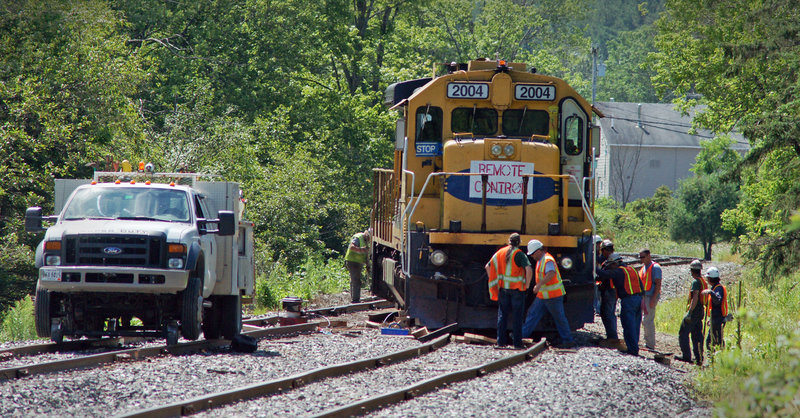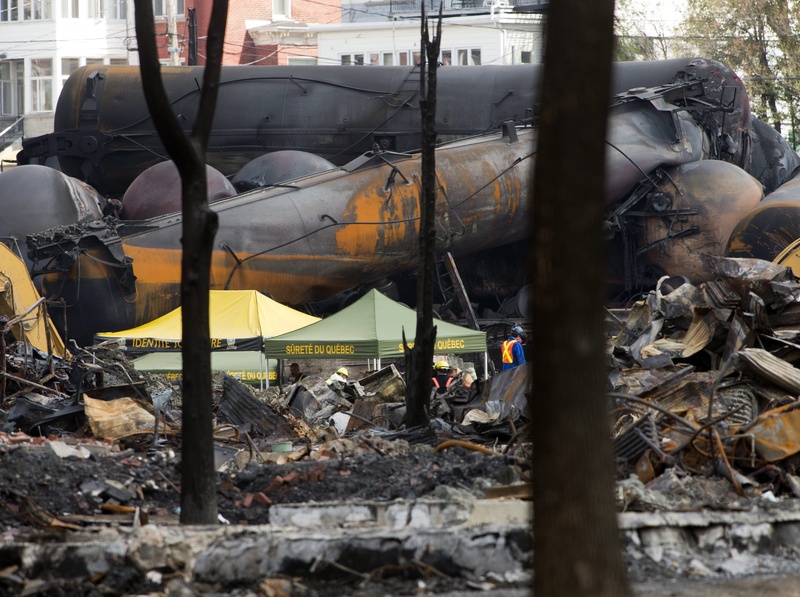Less than a month after a runaway Maine railroad train carrying crude oil derailed and exploded in Quebec, leaving 47 people dead, the Federal Railroad Administration on Friday issued an emergency order aimed at preventing a similar disaster in the United States.
The order prohibits trains transporting hazardous materials from being left unattended on a mainline track or side track outside a yard or terminal unless specifically authorized to do so.
Also Friday, Maine U.S. Rep. Mike Michaud introduced a bill that would effectively ban the practice of one-person crews on freight trains. The U.S. Department of Transportation, which oversees the Federal Railroad Administration, said it believes that railroad safety is “enhanced through the use of multiple crew members,” but it stopped short of banning the practice of one-man train crews.
The train that derailed in Quebec had been left unattended and its owner, the Montreal, Maine & Atlantic Railway, routinely uses one-man crews.
While U.S. transportation officials wait for the results of the full investigation into the July 6 accident in Lac-Megantic, Quebec, the Department of Transportation is taking steps to prevent a similar incident from occurring in this country, Transportation Secretary Anthony Foxx said in a statement Friday evening.
The Federal Railroad Administration’s order is a mandatory directive to the rail industry, and failure to comply will result in enforcement actions, he said.
The order gives the nation’s railroads 30 days to comply with the following measures:
• No train or vehicles transporting specified hazardous materials can be left unattended on a mainline track or side track outside a yard or terminal without the authorization of the Federal Railroad Administration. To receive authorization, railroads must submit a plan for securing unattended trains transporting hazardous materials, including locking the locomotive or otherwise disabling it, and reporting among employees to ensure that the correct number of hand brakes is applied.
• Workers responsible for securing trains transporting hazardous materials must tell train dispatchers the number of hand brakes applied, the tonnage and length of the train, the grade and terrain features of the track, and any relevant weather conditions. Train dispatchers must record the information provided and verify that it meets the railroad’s requirements.
• Railroads must ensure that any employee involved in securing a train participate in daily job briefings.
• Before a train can be left unattended after an emergency incident, such as a fire, a qualified railroad employee would have to inspect all rail equipment that an emergency responder had been on, under or between.
Because the Federal Railroad Administration issued its emergency order Friday evening, it was not immediately clear how U.S. railroads would react to it. But the rail agency’s administrator, Joseph Szabo, said in a statement he is encouraged by the industry’s willingness to cooperate with the agency’s approach.
“The safe shipment of all cargo is paramount and protecting the safety of the American public is fundamental to our enforcement strategy,” Szabo said.
Canadian transportation officials continue to investigate how a parked, unattended train operated by Hermon-based Montreal, Maine & Atlantic crashed in Lac-Megantic, setting off explosions that destroyed the center of town.
The train, which was hauling 72 cars of crude oil, rolled down a hill after its engineer parked it and went to a hotel. Canada’s Transportation Safety Board has ruled that the brakes weren’t applied with sufficient force to hold the train in place.
Shortly before the train ran away, local fire crews responded to a fire on one of its locomotives when it was seven miles outside of Lac-Megantic. After the fire was put out, two railroad employees arrived on the scene. The firefighters left soon after the railroad workers said the situation was under control. Michaud’s bill, the Safe Freight Act, would require a minimum of two-person crews for all freight trains.
In a statement, he said it’s common sense that it would be better to have two crew members on a train rather than one.
“Trains can be a mile or more long and carry volatile shipments such as ethanol and oil,” said Michaud, who sits on the House Transportation and Infrastructure Committee and also on a subcommittee that focuses on rail issues.
U.S. Rep. Chellie Pingree is co-sponsoring the bill. In the last few weeks, the two Maine Democrats have met with the heads of the Pipeline and Hazardous Materials Safety Administration, National Transportation Safety Board and the Federal Railroad Administration.
Although the July 6 accident isn’t being blamed on the practice of having a one-man crew, its use has come under scrutiny since then.
The Canadian government on July 23 issued an emergency order requiring that trains operating in Canada and carrying hazardous cargo have two crew members.
The use of one-person crews is uncommon in the United States, according to a spokesman for the Federal Railroad Administration.
Of the six privately owned freight railroads in Maine, the Montreal, Maine & Atlantic Railway is the only one that uses one-man crews. The railroad has been doing so for several years.
Ed Burkhardt, chairman of the railroad and president of its parent company, Chicago-based Rail World Inc., was among the first railroad operators in the United States to advocate for one-man crews, a money-saving measure made possible by the use of remote-control technology.
When an engineer leaves a train to uncouple cars, for example, he uses remote control technology to control a train’s movements.
Two national unions representing rail workers issued statements Friday in support of Michaud’s bill.
The Transportation Division of the Sheet Metal, Air, Rail and Transportation International Association and the Brotherhood of Locomotive Engineers and Trainmen said the legislation reflects heightened concerns over crew size arising from the July 6 derailment.
Dennis Pierce, national president of the Brotherhood of Locomotive Engineers and Trainmen, called on the House to take up the bill and hold hearings at its earliest opportunity because the use of one-person crews puts the public at risk.
Pingree said the legislation is a first step in ensuring rail safety.
“Having only one person on board who is responsible for a train’s safe operation simply allows too much room for errors to go uncorrected,” she said in a statement.
Pingree is married to S. Donald Sussman, majority share owner of the Portland Press Herald/Maine Sunday Telegram.
Tom Bell can be contacted at 791-6369 or at tbell@pressherald.com.
Send questions/comments to the editors.




Comments are no longer available on this story